Research About
Lindsey Joyce Chamberlain
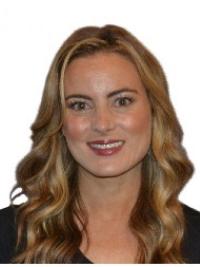
Lindsey Joyce Chamberlain is the Assistant Dean for Academic Enrichment in the college. She oversees and provides support to the Honors program, several Scholars programs, global education, undergraduate research, and service learning. Lindsey is originally from Indianapolis, Indiana and attended DePauw University for her undergraduate degree. Dr. Chamberlain earned a PhD and an MA in Sociology at The Ohio State University with a focus on organizational health and processes. Her research interests included workplace autonomy and sexual harassment. Dr. Chamberlain previously served as assistant director for University Honors and Scholars where she spearheaded assessment of all honors programs. In addition to her role in ASC Honors, Lindsey teaches an honors course in which students partner with local non-profits to work on research projects. In her free time, Lindsey enjoys traveling, cooking, and spending time with family and friends.
Ed Quinn
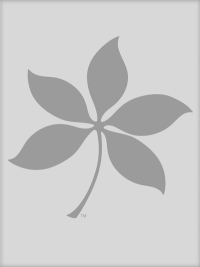
Ed Quinn is the Undergraduate Thesis and Arts Honors Program Manager. Management of the undergraduate thesis includes the administration of Research Distinction, Arts Distinction, the Arts Undergraduate Research Scholarship, and the Arts & Humanities Undergraduate Research Small Grant. In addition to his management of the Undergraduate Thesis and Arts Honors programs, Ed has experience teaching college film and television courses, including seven years as a lecturer for the OSU course Criticizing Television. He earned an MFA in Film and Television Production and an MA in Cinema Studies from the Savannah College of Art and Design and is a practicing film and video artist. His work has been screened nationally and internationally.
Rebecca Sallade (she/her)
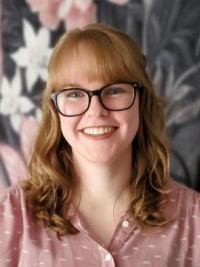
Rebecca Sallade is the Undergraduate Research, Honors Thesis, and Honors Project Coordinator adjacent to the ASC Honors team. Rebecca got her Bachelor of Science in Psychology from The Ohio State University in 2017. Her primary research experience at OSU was in Educational Psychology, and she enjoyed working with students from Columbus Public Schools to conduct interviews, code data, and help with manuscript writing! Rebecca then got her Master’s in Public Health, studying Health Education & Promotion, at the University of Cincinnati in 2020. She became a Certified Health Education Specialist in April of 2021. Rebecca is a certified Mental Health First Aider, QPR certified, and prioritizes trainings to combat the stigma surrounding mental health help-seeking behaviors.
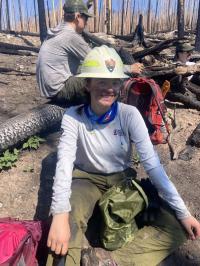
Claire Sneed (she/her)
Earth Sciences Major, Year 4
Research Lab/Topic: Dr. Yanlan Liu's Ecohydrology Research Group, where I use remote sensing data and Python to analyze how forests recover from wildfires!
How I Found my Lab: I was introduced to Dr. Liu when I took her first Ecohydrology class in Spring 2022. I was the only undergraduate student in the class, so I had to go to her office hours a lot and got to know her and her research through that class. I was really interested in the work she was doing, and everyone in the Earth Sciences department is required to do a senior thesis, so we decided to work together.
My Favorite Part about Research: Being able to integrate all that I've learned in all my Earth Sciences classes and time spent working on trail crews out west into a cohesive project that I get to control, while also having as much guidance and help from my advisor as I need.
I’m Pursuing a Thesis Because: I spent two summers working in the wildfire affected areas of North-Central Colorado on trail crews and became fascinated with forest dynamics and wanted to learn more. Getting involved in research provided me with an opportunity to learn more about forests and wildfires from a geosciences perspective.
Advice for Undergrads: Reach out and meet with faculty that interest you...the earlier, the better! There are so many amazing professors doing research here, and all of them love getting students involved with their research! It's ok if you don't know what you're doing (I definitely didn't when I first started)...just keep asking questions and you'll be surprised at how much you can learn through research!
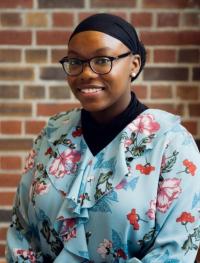
Emoni Harmon (she/her)
Religious Studies and World Politics Dual Degree, Class of 2023 (currently pursuing an MA in WGSST at OSU!)
Research Lab/Topic: My research broadly focuses on how religious women, specifically Muslim and Christian women, mobilize embodied forms of feminist or anti-feminist rhetoric to respond to the discourse of the sexual female body in the West. However, I have most recently been focused on how specifically #tradwives, who are mainly white conservative Christian women, utilize embodied and traditional forms of rhetoric online to promulgate anti-feminism in the name of restoring/reviving the West’s 'traditional' understandings of gender, family, and culture.
My Favorite Part about Research: I think my favorite part about pursuing research is getting to contribute to the discourses I am passionate about because I am subject to/involved in shaping them as a religious woman and feminist. Thus, I like to think of my work as an extension of both my religious and feminist commitments, which helps me to stay motivated and ethical/responsible as a researcher, given how much is at stake for myself and the communities I focus on. So, while I fully recognize the contentious nature of my research, I find it necessary because it is contentious. What we find difficult to talk about is exactly what we should be discussing, as silence creates space for harm to thrive.
I’m Pursuing a Thesis Because: I decided to pursue a senior thesis because my earlier papers, which focused on how hijab-wearing Muslimahs in the West navigate the politicization of their bodies and religiosity in light of the discourses of feminism, secularism, and multiculturalism, left me fascinated with the real potentiality of an intersectional approach that holistically addresses religion/religiosity as a component of identity. In my own life, religion is a big part of how I understand myself a black woman, so I wanted to explore if and how religion shapes the lives of other women.
Advice for Undergrads: I would say to undergraduates looking to get involved with research to do so sooner rather than later! I know I waited till my senior year because I felt like I did not have anything significant enough to contribute to my fields when, in reality, what I had to contribute was significant not because it was novel but because it built upon, challenged, and expanded the thoughts of scholars who came before me. In realizing the thoughts of every intellectual were not generated alone, I came to not expect mine to be either. So, please do not expect yours to be built alone; please contribute to the discourses and disciplines that matter to you.
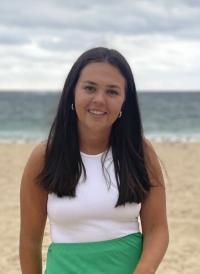
Emma Wilson (she/her)
Speech & Hearing Science Major, Year 3
Research Lab/Topic: I work in the Crane Research Center focusing on child language development.
How I Found my Lab: I found my lab through an email that my academic advisor sent out, suggesting for those in the major to apply to the position.
My Favorite Part about Research: My favorite part about pursuing research is working with the kids that I see every day and being able to witness their improvement.
Advice for Undergrads: My advice for undergrads would simply be to not be scared of reaching out! It may feel like you are not qualified for a specific position, but it never hurts to reach out and apply.
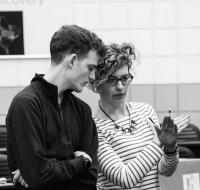
Sarah Neville (she/her)
Associate Professor, Department of English
Associate Professor, Department of Theatre, Film, and Media Arts
Research Lab/Topic: I'm the founder and creative director of Lord Denney's Players, a theatre company at OSU that researches how technologies of textual transmission have influenced the reception of Shakespeare's plays. LDP uses performances of Shakespeare as a laboratory space to explore how Shakespeare's plays changed during and after his lifetime.
My Favorite Part about Research: My favorite part of this research occurs when we explore a "crux" or moment of problem in a play that critics have long tried to correct through altering or emending the words. Sometimes, in our rehearsal room, we can defend the reading of the original text simply by adding a gesture, a property, or a different intonation, which often calls critics' claims of error into question and sometimes disproves them entirely.
Favorite Part about Working with Undergraduate Researchers: I love working with undergraduate researchers because they can often see things free from the influence of the "right answers" that authorities have passed down, allowing them to ask new questions.
If I could go back and give myself advice as an undergraduate researcher/give advice to current undergraduate researchers: The topic of my book, Early Modern Herbals and the Book Trade (Cambridge, 2022), was initially sparked by research I did as an undergraduate at the University of Toronto. I was studying an herbal from 1597 and I was unhappy with the critical literature about it, which seemed to disregard some of the features of the book that I found most interesting. A few years later, when I was looking for a topic for my doctoral dissertation, I settled on some of the research questions about herbals that my undergraduate curiosity had raised years earlier! My one piece of advice to undergraduate researchers is to move beyond the "what", "where", and "when" questions, because asking "how" and "why" is where you find the best stories.
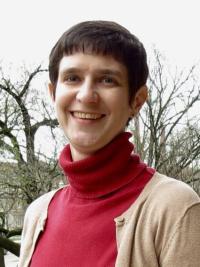
Cynthia Clopper (she/her)
Distinguished Professor, Linguistics
Research Lab/Topic: Speech Perception
My Favorite Part about Research: My favorite part of research is looking at the data: making graphs to illustrate the most important findings, analyzing the data statistically, interpreting the results to answer the research question, and discovering new things.
Favorite Part about Working with Undergraduate Researchers: My favorite part about working with undergraduate researchers is watching them put the pieces together: drawing on what they’ve learned from their reading of the primary literature, looking at the data, and seeing how the work that they are doing contributes knew knowledge to the field.
If I could go back and give myself advice as an undergraduate researcher/give advice to current undergraduate researchers: Be brave! If you want to get involved in research, talk to your instructors (faculty and graduate students) about their work and ask if you can help. I always need help in my lab!
I am an ASC Honors Student. Is there anything specific I should be doing?
Short answer- nope! It is strongly preferred that you take the Honors section of 4998H if receiving credit for research (if your department allows), and is required that you take the Honors section of 4999H if pursuing a thesis. Click here to learn more about pursuing an Honors thesis. Questions can be directed to sallade.3@osu.edu.
Am I eligible to receive academic credit for my research experience?
The first step would be to talk to your PI for approval. Some grant funding is particular about undergraduate students receiving academic credit for research (especially if the opportunity is also paid), but this is a rare issue.
Can I do research with someone outside of OSU?
Many students pursue research with faculty outside of OSU (like at Children’s Hospitals, universities back home, etc.). Academic credit is possible as long as you find an approved faculty/staff member to house your 4998(H) hours. Please talk to your Academic Advisor for more information.
Please note if you are intending on pursuing a thesis project, your Project Advisor must be a faculty member at Ohio State.
Can my 4998(H)/4999(H) hours be used to satisfy degree requirements?
Research/thesis contribute to your 121+ hours required for graduation. Whether or not these credits can be used for something else (like major electives) is up to your Advisor.
Feeling overwhelmed with the search process or have questions about undergraduate research? Help is available!
Besides chatting with your departmental advisor and consulting your major’s website, individual consultation appointments are also available. Schedule an appointment by emailing sallade.3@osu.edu (general questions, Honors Research Distinction) or quinn.142@osu.edu (general questions, arts majors, Research Distinction) for an individual consultation.
